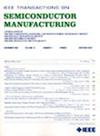从 DSH 到扩展-DSH:基于解耦回归策略的芯片级化学机械平坦化 (CMP) 模型升级
IF 2.3
3区 工程技术
Q2 ENGINEERING, ELECTRICAL & ELECTRONIC
引用次数: 0
摘要
化学机械平坦化(CMP)对于确保纳米尺度的芯片制造一致性至关重要。一系列现象学 CMP 过程模型的出现(Stine 等人,1997 年;Gbondo-Tugbawa,2002 年;Xie,2007 年;Vasilev,2011 年)表明,现有的模型升级方法在很大程度上是基于现象学模型假设的改变,需要深入了解复杂的过程机理,并需要较长的时间来提高精度。为解决这一问题,本文提出了一种用于模型升级的解耦回归策略。该策略采用数据驱动的方法来增强模型内部的耦合关系,从而在现有模型的基础上不断提高模拟精度。即使在建模人员缺乏对复杂过程机制的洞察力的情况下,它也能实现模型精度的提高。我们通过将密度阶梯高度(DSH)模型升级为扩展-DSH 模型来验证我们的方法,以解决 28 纳米节点侵蚀预测不佳的问题。将模型预测与硅数据进行比较后发现,Extend-DSH 模型与测量数据的吻合度更高,均方根误差从 159.31Å 减小到 6.89Å,决定系数从 -0.83561 增加到 0.6058,展示了基于解耦回归策略的芯片级 CMP 模型升级方法的有效性。本文章由计算机程序翻译,如有差异,请以英文原文为准。
DSH to Extend-DSH: Chip-Level Chemical Mechanical Planarization (CMP) Model Upgrade Based on Decoupling Regression Strategy
Chemical mechanical planarization (CMP) is vital for ensuring chip fabrication uniformity at nanometer scales. The emergence of a series of phenomenological CMP process models (Stine et al., 1997; Gbondo-Tugbawa, 2002; Xie, 2007; Vasilev, 2011) suggests that the existing model upgrade approach is largely based on a change in phenomenological model assumptions, demanding deep insights into complex process mechanisms and protracted period for accuracy improvements. To tackle this issue, this paper proposes a decoupling regression strategy for model upgrades. This strategy employs a data-driven approach to enhance the coupling relationships within the model, facilitating continuous improvement of simulation accuracy based on the existing model. It is capable of achieving improvements in model accuracy even in scenarios where modelers lack insight into complex process mechanisms. We validate our method by upgrading the Density Step Height (DSH) model to the Extend-DSH model to address poor erosion predictions at the 28nm node. Comparing model predictions with silicon data reveals that the Extend-DSH model aligns better with the measured data, reducing the root mean square error from 159.31Å to 6.89Å and increasing the coefficient of determination from -0.83561 to 0.6058, showcasing the effectiveness of the proposed chip-level CMP model upgrade method grounded in the decoupling regression strategy.
求助全文
通过发布文献求助,成功后即可免费获取论文全文。
去求助
来源期刊

IEEE Transactions on Semiconductor Manufacturing
工程技术-工程:电子与电气
CiteScore
5.20
自引率
11.10%
发文量
101
审稿时长
3.3 months
期刊介绍:
The IEEE Transactions on Semiconductor Manufacturing addresses the challenging problems of manufacturing complex microelectronic components, especially very large scale integrated circuits (VLSI). Manufacturing these products requires precision micropatterning, precise control of materials properties, ultraclean work environments, and complex interactions of chemical, physical, electrical and mechanical processes.
 求助内容:
求助内容: 应助结果提醒方式:
应助结果提醒方式:


